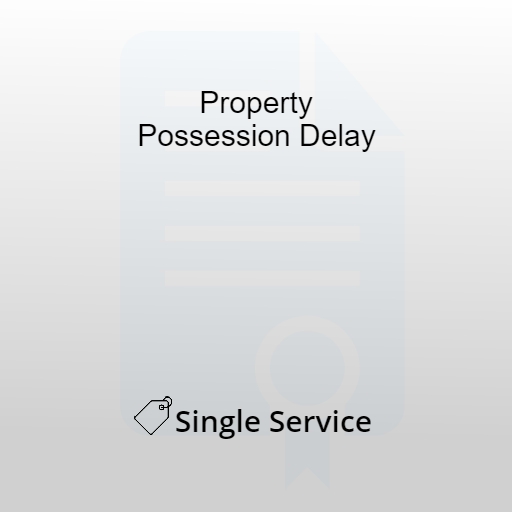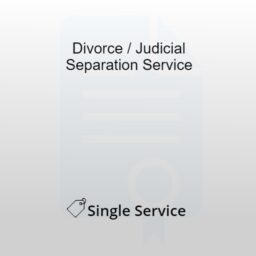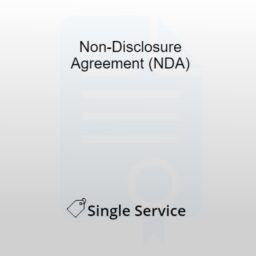Property Possession Delay-India
| Type of Consumer Protection Delay | Individual Property Possession Delay, Commercial Property Possession Delay |
|---|---|
| Jurisdiction | India |
Property Possession Delay-India
₹39,999.00 – ₹59,999.00
Have you been feeling aggrieved by the developer or the seller of the property you’ve recently bought from, who has been failing to transfer the possession to you on time? You can resort to legal remedies under India’s consumer protection laws. How painful it is when you’ve been capitalizing your hard-earned money to buy a property of your own and do not come into possession by the time it has been agreed. Moreover, this presents a real financial risk for those taking a loan or planning to mortgage their new property. Having to approach the seller time and again to enforce this possession can be a most tedious and dire frustration.
Allow LSC to facilitate a smooth and a hassle-free process, taking action against the seller for not abiding by binding promises. We will ensure you obtain what is rightfully yours.
| Type of Consumer Protection Delay | Individual Property Possession Delay, Commercial Property Possession Delay |
|---|---|
| Jurisdiction | India |
₹39,999.00 – ₹59,999.00
Cost Note: Just Filing. Excl. official fees, ie. court fee, filing fee.
In a Property Possession Delay under the Consumer Protection Act, 2019, a legal notice is a first step of formal communication to another party apprising about the problem of the aggrieved to undertake legal proceedings against them. Conversely, if the other party ignore the notice or doesn’t accept his fault, or fails to provide a suitable remedy through mediator process then we can go ahead and file a consumer online or offline mode of complaint with the District Consumer Disputes Redressal Forum, the State Consumer Disputes Redressal Commission or the National Consumer Disputes Redressal Commission.
We have strict policy measures and procedures for every stage of the consumer forum process to ensure the most accurate overview of a client’s general trustworthiness. We have an in-house team of highly qualified lawyers for all kinds of consumer protection cases. We assist you with legal advice on consumer protection. We will further assist you with all types of legal advice on unfair trade practice matters. We shall provide you with mediation proceedings, if required. We also established a legal advice helpline for all contingent Indian consumer law matters to provide online legal advice and online legal services via email. We further provide you the services of an online lawyer chat. To provide online legal forms, legal documentation related to consumer law. Under this act, the clients can file complaints in the District forum claiming up to Rs. 20 Lakh, while filing the complaint in State Consumer Dispute Resolution Commission (SCDRC) for Rs 20 lakh to Rs. 1 Crore and in National Consumer Dispute Resolution Commission (NCDRC) for more than Rs. 1 Crore. We will assist you with the forum according to your problem. We will provide all legal services related to the matters before the Competition Commission of India (CCI), the National Consumer Disputes Redressal Commission (NCDRC), etc. We have established a legal advice forum for all matters related to consumer protection law in India. We will allow the buyers to get a refund with interest or possession with delay compensation for litigation cost, mental harassment, etc.
While conducting the property possession delay process in the Consumer forum. There are two methods to solve your problems. Firstly, a mediation proceeding and second is consumer complaints by online mode. There is a checklist that is referred to which differs according to the specifics of a case.
MEDIATION PROCEEDING:
The New Act introduces Alternative Dispute Mechanism for the speedy and effective redressal of the consumer cases.
Initiation of Mediation Proceedings:
- If the commissions thinks there is a possibility of a settlement of the dispute between the parties, then same can be transferred to Mediation Cell or ;
- The written request can be made by either of the parties to the District, State or National Commission stating such as details of the parties, nature of the dispute, amount involved, relief sorted and proposal for appointment of Mediator (Language, Qualification, experience, etc.)
Procedure to be followed:
- Parties can mutually agree on the procedure to be followed or;
- If parties fail to come for mutual ground, then the mediator shall follow the procedure mentioned below :
- Mediator shall fix the time, date and venue, where parties have to be present or ;
- Mediation Proceedings can be held at the Mediation Cell attached to the District, State or National Commission.
- Joint/ Separate meetings of the parties to be conducted.
- Within the period of 10 days, before the session, both the parties shall submit the Memorandum of Issues to the mediator and other parties involved highlighting the issues which need to be resolved.
- Necessary information to be provided to the mediator by both the parties.
- Mediator shall facilitate a voluntary resolution between the parties, communicate views of the parties and help assist the issue.
- Within the period of 30 days the parties should reach an amicable settlement.
- If the parties arrive at a settlement, the same shall be reduced in writing and the same needs to be signed by both the parties and Mediator. Mediator shall further submit the detailed report of settlement to the concerned commission.
- If parties failed to reach a settlement, then the Mediator shall submit the report to the commission stating the reasons for non-settlement.
CONSUMER COMPLAINT:
In the new act of Consumer Protection Act, it states the online filing of Consumer Complaint.
- Issuance of Notice: Before the filing of the complaint, it is advisable for the complainant to issue a notice to the opposite party, highlighting the defects/deficiencies in the goods or services provided. If parties don’t agree to come to a mutual understanding then the complainant can file a complaint before a jurisdiction authority/forum.
- Determining the Jurisdiction: The Complaint has to be filed within the Pecuniary and Territorial Jurisdiction.
Pecuniary Jurisdiction: (As Per NEW ACT)
- District Commission: Amount not exceeding 1 crore
- State Commission: Rupees 1 Crore to 10 Crore
- National Commission: Amount exceeding Rupees 10 Crore
Whereas, under OLD ACT, the pecuniary jurisdiction was as below:
- District Commission : Amount not exceeding Rupees 20 lakhs
- State Commission: Rupees 20 Lakhs to 1 Crore.
- National Commission: Amount exceeding 1 Crore.
Territorial Jurisdiction: Place where the opposite party resides or if there are more than one opposite party, then the place where opposite parties reside or carry on business or personally works for gain.
Submission of Complaint:
Complaint can be submitted in the form of Writing or through Online.
- Registration of Online Complaint
- Aggrieved Party can register complaints on https://consumerhelpline.gov.in/ .
- Complaints can be registered by filling essentials details like name, email, contact number & password.
- Complaint will receive login credentials through which he can register a complaint by uploading required documents.
- There are different portals available for different sectors.
- A consumer can also register complaints through Mobile Apps namely the NCH app, Umang App or Consumer App.
- Post-registration of the complaint, complainant will be provided with a unique identification number through which he can determine the status of the complaint.
- Fees for the complaint can be submitted through an online payment portal.
Contents of the Complaint:
Complaint should contain the following information
- Name and complete details of complainant and opposite party.
- Date and time of purchase of goods/ availing of services.
- Necessary Facts of the case establishing the cause of action.
- Particulars of dispute: Defect in goods/ deficiency in service.
- Relief sought
- Copies of the documents supporting the contention of the complainant. (Invoice, Warranty receipt, etc)
- Limitation for filing Complaint/Appeal: The Complaint before the District Commission needs to be filed within the 2 years from the date of dispute. Further, appeal before the State Commission to be filed within 45 days from the date of order of District Commission. Further, appeal to the National Commission should be made within 30 days from the date of receipt of the order from the lower forum.
- Court Fees: A prescribed fee is required to be paid along with the complaint filed depending on the forum. The court fee depends upon the value of goods bought and the amount of compensation sought.
- Submit an Affidavit: The person who wants to file a case in the Consumer Court is also required to submit an affidavit in the court. The affidavit must state that the facts presented and statements made by the consumer are true to their knowledge.
The general documents required are:
- Application for buying of property in the Project
- Builder-Buyer Agreement
- Invoices relating to provision of goods and services
- Receipts of payments made to the Builder
- Letters/ email correspondences between the Buyer and the Builder
- Proof of deficiency in goods or services provided
- Any written/recorded communication with the goods/service provider regarding the matter
- Brochure of the Project
- Letter of Allotment
- Flat size and carpet area
- Terms of payment and other details
What Shall You Obtain?
The process is undertaken by highly qualified professionals and therefore shall be with a bona fide intent. After the property possession delay under consumer forum is completed, the customer shall be given a Complete Certified Property Possession Delay Report along with the certified supporting documents for each activity undertaken.
Duration Until Completion
The entire procedure, in most cases, is completed within 1 or 2 years to solve a case and its court fees vary from Rs. 2,000 to Rs. 5,000. The litigation of District Forum costs about Rs. 10,000 – 20,000, Rs. 30,000 – 60,000 for SCDRC and Rs. 60,000 – 2, 00,000 for NCDRC.*
What is the time frame for drafting a legal notice?
The timeframe to draft a legal notice for wrongful termination can depend on the content of the notice. It can approximately take a week to draft and alter the same.
Why should one avail of these employment services?
We at LSC, offer the assistance of our licensed lawyers. They are experts in the area of employment laws in India. They will guide you at every step in the legal proceeding and provide you legal advisory on all the queries.
Who can avail of the employment services?
Any person who is a staff member/employee working in organizations, institutions, government entities, agencies, or companies deprived of their right to work can avail of these services.
Why is it necessary to file a legal notice?
It is necessary to file a legal notice for wrongful termination, as this right can be legally restored by law administrations. Legal notice can be filed only when the employee’s right to work is violated. Termination can only sustain by reasonable grounds
Is there a limitation on making a legal notice for unpaid salary?
Since there is no specific provision for the period of limitation in the Act, the period of limitation starts running from the period when the cause of action accrues, which in employment cases would be receipt of the letter of termination.
What are the advantages of filing a legal notice?
Sending a legal notice is an ultimatum to the person before entering into a legal proceeding. The compensation and restoration of the post will then be awarded based on the merits of the case by court orders.
Under what grounds can the employee be wrongfully terminated?
The employee can be wrongly terminated under unpleasant circumstances such as discrimination, personal grudge, breach of trust, etc.
What does this unpaid salary legal notice service offer me?
Our services offer you premium lawyers who are experienced in the labour laws of India. They will draft a legal notice on your behalf and represent you in court.
Under what Acts is the wrongful termination of employees protected?
The following Acts are governed by provisions to protect the rights of the employee in India. The Industrial Disputes Act, 1947, The Workmen’s Compensation Act, 1923.
What purpose does the legal notice serve?
When the employer wrongfully terminates without giving reasonable grounds, the applicant can send a legal notice to the employer who has to reply to the same within time failing which the applicant can approach the court.

LSC Assurance of Secured Payment
Assured Quality Service Delivery
Fully Dedicated Case Managers
Post-Delivery - Review Facility
"As a first line of communication, we will need the following particulars from you to action this service. To facilitate our inital review, please collate your relevant documents into a single file and upload where requested."
₹39,999.00 – ₹59,999.00








